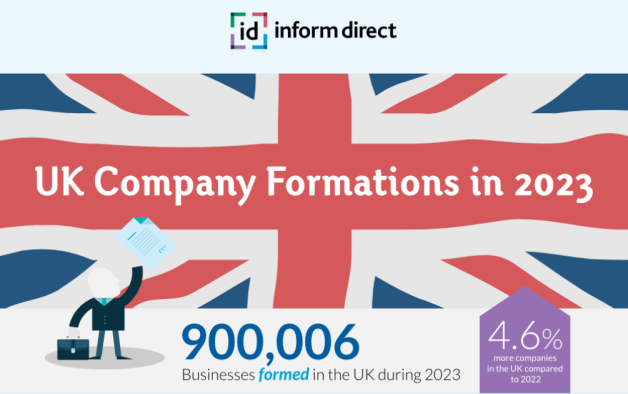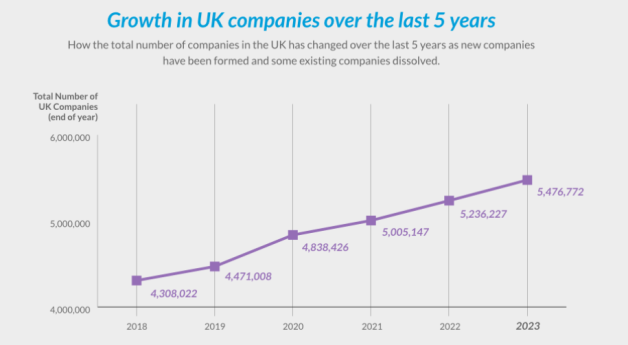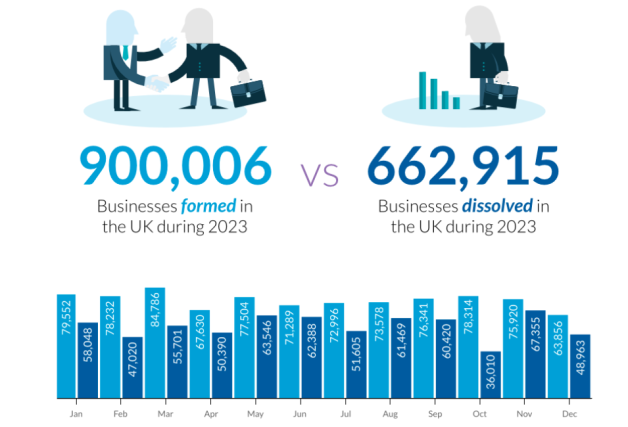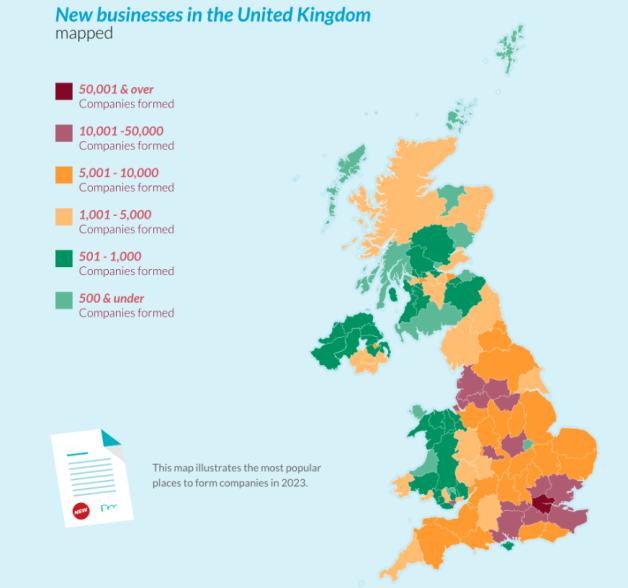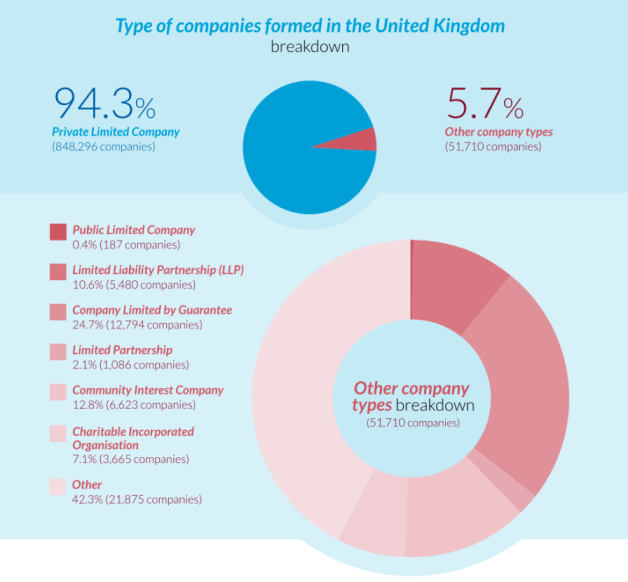We’re pleased to share the Inform Direct 2024 Review of UK Company Formations.
Our annual study represents the most comprehensive analysis of UK company formations and dissolutions and is produced using data from Companies House and the Office of National Statistics.
We examine the data UK-wide and for each member nation and its individual counties, giving you the tools to track regional business performance from Stirling to Stevenage.
You can drill down and see the statistics for individual districts and wards. To gauge performance over time you can compare figures for 2023 with those of previous years.
In this article we explore what the data tell us about the performance of UK business in 2023 as we head into what looks likely to be an election year.
A better way to form a new UK company
Inform Direct is the perfect tool to make forming a new UK company a whole lot easier:
> Easy, intuitive online process
> Great choice of packages and extras
> Excellent value for money
> Compliant documents, registers supplied
> Backed by dedicated, expert support
A landmark record for UK companies
The headline figure for UK company formations is that they topped the 900,000 mark in 2023, an all-time record. It suggests that business confidence has stayed resilient despite growing costs for UK businesses and rising inflation and interest rates in 2023, coupled with tepid consumer confidence due to the cost of living crisis. A positive factor for new businesses has been the continued rise of e-commerce and associated technologies, which facilitate immediate access to markets for start-ups and help keep initial costs down.
The majority of new businesses formed were small or micro in size. How many of these seeds flourish and how many fall on stony ground will shape the economy in coming years, since the most successful businesses will become major contributors to job creation and wider economic benefits.
Following this record year for formations there are more UK companies in existence than ever before. The total of 5,476,772 represents an increase of 4.6% over 2022. The growth of total companies takes account of both formations and dissolutions and the figure of 4.6% is about average for the last 10 years.
Regional variations
Within the encouraging national picture for 2023 there were some marked regional variations.
England led the way in raw company numbers with 769,385 companies formed, as might be expected, but it also came out ahead when adjusted for population, with 14.5 new incorporations per 1,000 people. This healthy rate of company formations per head of population has produced the previously mentioned annual growth in company numbers.
Within England, London dominated the rest of the country in incorporations, again even with figures adjusted for population. Of the 769,385 companies formed in England, 313,446 started life in one of the London boroughs. Despite the capital losing some ground as a financial centre after Brexit, the lure of a London registered office address continues to be as strong as ever.
Outside London the best performances were seen in the West Midlands (44,594 companies formed), Greater Manchester (41,222), West Yorkshire (24,534) and Essex (20,333). Twenty-five English counties saw record growth in company formations. These included not only population centres like Greater Manchester but also more rural areas like Lincolnshire and Suffolk.
Wales came second only to Northern Ireland in year-on-year growth of company numbers, with 9.8% more companies than at the end of 2022. Figures for Wales are often skewed by bulk cross-border address movements by Companies House. Even though more companies were dissolved in Wales than formed (29,067 dissolved vs. 27,162 formed), the total number of companies grew by 9.8%. This is due to some existing companies temporarily having their registered address moved into Wales (specifically, Companies House’s offices in Cardiff) from outside it.
Northern Ireland topped the table with 10.1% growth in company numbers, more than double the growth rate it showed in 2022. 13,704 companies were formed in Northern Ireland in 2023 versus 6,008 dissolved. This strong performance reflects a positive trading environment for Northern Irish businesses, with the Northern Ireland Chamber of Commerce reporting strong growth in sales to Great Britain, the Republic of Ireland and further afield. Following a period of uncertainty over cross-border trade, this may be a rebound catalysed by the Windsor Framework, an agreement between the EU and the UK in respect of post-Brexit trade arrangements.
Scotland set a new record for company formations with 38,926, bringing the total number of companies to an all-time high of 290,739. However, it also saw a record number of dissolutions with 29,512. This reduced the growth figure to 3.5% over 2022, which continues a downward trend of slower growth in Scotland than other areas of the UK. One possible factor in this could be the decline in numbers of Scottish limited partnerships, a legal form called into question in recent years over corporate transparency issues. In 2016, 85.7% of companies that were not private companies limited by shares were limited partnerships; in 2023 the figure was down to 33.4%, the result of a steady decline as more foreign businesses have abandoned this legal form.
Company types
Something we don’t always mention in our annual reports is the types of companies formed. The following figures represent the typical spread of company types, but it’s good to see that community interest companies (CICs) continue to grow in popularity since they were introduced in 2005. This growth has been partly due to healthcare spinouts from the public sector, especially the NHS, although CICs also include small businesses like coffee shops and nurseries who have chosen the benefits of the CIC legal form. Many CICs are formed by existing limited companies applying to convert to the CIC model. Their growth is a trend that shows no signs of slowing down.
Here is the breakdown of formations by company type:
Private limited company 94.3%
Other company types 5.7%, of which:
Company limited by guarantee 24.7% (12,794 companies)
Community interest company (CIC) 12.8% (6,623 companies)
Limited liability partnership (LLP) 2.1% (1,086 companies)
Charitable incorporated organisation (CIO) 7.1% (3,665 companies)
Limited partnership 2.1% (1,086 companies)
Public limited company (PLC) 0.4% (187 companies)
Other 42.3% (21,875 companies)
What’s the outlook for 2024?
The 2023 figures show a lot of promise for 2024, demonstrating as they do the resilience of the British entrepreneurial spirit. The number of UK companies and the rate at which they are formed have continued to grow at a healthy rate, outstripping previous years and showing no signs of a slowdown.
It is possible that 2024 may see some weakening of growth due to the effects of inflation and the rising cost of business borrowing. Some newly formed companies may have to scale back their ambitions as a result of these hindrances, leading to modest business performance in 2024.
First-time directors of new companies need to be aware of their statutory responsibilities as they navigate their first year of business. A key milestone is delivering their first annual accounts and confirmation statement. A good accountant can assist with these goals by guiding them in the formal legal requirements of running a company and providing sound strategic advice to help them succeed.
Inform Direct makes it quick and easy to maintain statutory registers, manage company records and submit filings to Companies House at the touch of a button.

